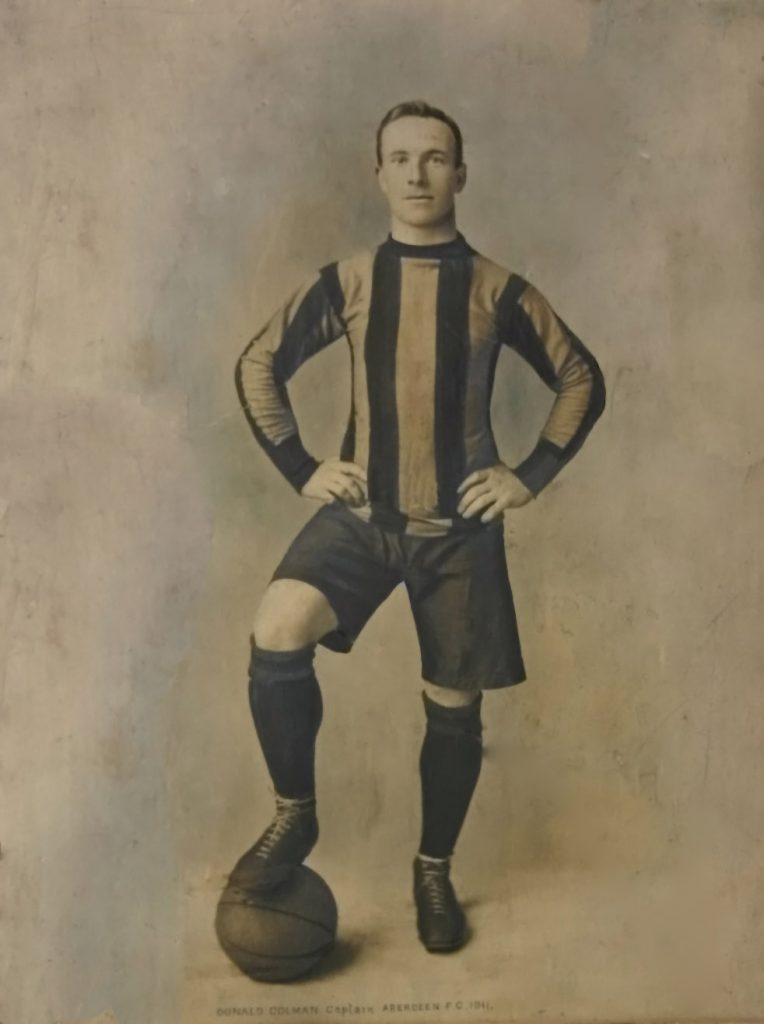News

AFC Hall of Fame | Fourth Inductee Revealed
Aberdeen Football Club can announce today that Donald Colman will be posthumously inducted into the AFC Hall of Fame next month.
The former player, captain and trainer was nominated for the award by the Aberdeen FC Heritage Trust.
The event, which is sponsored by Aberdeen Taxis and will take place in the Marcliffe, will see Donald enter the 2018 edition of the Hall of Fame along with Bobby Clark, Eoin Jess and Peter Weir.
Established in 2004, the AFC Hall of Fame recognises players and managers who have reached the pinnacle of their profession, making a significant contribution to the reputation of this historic club.
RedTV | Chris Gavin from the AFC Heritage Trust tells us more about the Donald Colman story. To watch please click here
The Donald Colman Story
Many players and managers who have been associated with the Dons through the years have made significant contributions that have shaped the history of the club. Aberdeen supporters will readily recognise some of the clubs more recent servants and names like Willie Miller, Alex Ferguson, Teddy Scott, Joe Harper and Eddie Turnbull readily spring to mind. Donald Colman’s name should also be added to that list.
Before the Great War of 1914 Aberdeen were very much in their infancy and there were some tough times for all. The fact that the club came so close to going out of business during the war, bears testimony to the spirit of the players and club officials of the time. Donald Colman had been around Pittodrie since 1907 after he joined the Dons from Motherwell. Donald Cunningham was born on 14th August 1878 in Renton and it was not until he chose to pursue a career in football that he changed his surname to Colman as his father had been against him going down this route. In a lot of the early match reports that we have found his name was actually spelt Coleman.
Before he signed for Motherwell he had been capped for Scotland at Junior level and the general consensus was that he was deemed too small to make the senior grade. He began his career with Tontine Athletic before moving to Glasgow Perthshire. After eight years with Maryhill Juniors, at 27, he entered the senior game at a very late age. As a full back height was not essential but certainly an advantage. Colman turned that adversity positively when he signed for Aberdeen. He had been at Fir Park for two years but was released and it seemed that the doubters had been correct. It was at the suggestion of Aberdeen forward Jimmy Muir that persuaded Dons boss Jimmy Philip to take him north in what many viewed as a real risk. However, not unlike many players who played for the club before the war, Colman flourished at Pittodrie and soon emerged as a player of real ability.

Along with keeper George Mutch and left back Jock Hume, Colman formed the first formidable defensive combination that brought Aberdeen close to their first success on the national stage. It was at that time that Aberdeen made it through to the semi final of the Scottish Cup and came close to winning the championship in 1911 with a club record points and goals haul.
It was remarkable that he did not join the club until he was 29 and he was eventually honoured at full international level when he was 33 years of age, becoming the oldest Aberdeen player to be capped for his country. Such was the achievement, a special poem was written to mark the occasion. To read it please click here
Colman became the second Aberdeen player to represent Scotland after Willie Lennie in 1908 when he played right back for the Scots in their 2-2 draw against Wales at Ninian Park Cardiff on 6th March 1911. He earned a further three caps against Ireland at Parkhead in a 2-0 win and against England at Goodison Park in a 1-1 draw in April 1911. His final appearance for his country came in 1913 against Ireland in Dublin.
In his initial 13-year association with Aberdeen between 1907-1920, Colman at 42 years of age finished his playing career after making 346 first team appearances.
To read his stats in full please click here to visit his profile on the AFC Heritage Trust website.
During that time he received a benefit match from the club when Dundee came north on January 3rd 1912. An appreciative 4,000 crowd turned up to honour their loyal servant. Of course the Great War interrupted his career and after he had served in the battlefields of France, he returned to resume his remarkable career with Aberdeen.

Following his distinguished playing career at Pittodrie, Colman was to return as trainer, taking over from Billy Russell in 1931. An extract from the Press and Journal reporting the story on his return can be found here.
It was a role that he thrived on—in between his two spells with the Dons he had been coaching for a short spell in Norway and at Dumbarton and it was during his time there that he discovered the use of dug outs. It was perhaps the hostile weather conditions in that part of the world that prompted the Norwegians to seek some form of shelter, but the idea was brought back to Britain by Colman and Pittodrie housed the first dug out in Britain.
Belatedly Goodison Park in Liverpool, had the first dug outs in England after a trip to play in a Pittodrie friendly. It was also known that he continued playing on occasion for Dumbarton until he was 47 years old. His commitment to the game was astonishing as he juggled with his training responsibilities with summer coaching duties in Norway, passing on his experience. That experience was invaluable to the Aberdeen players as some of Colman’s thoughts and ideas were way ahead of his time.
For more information about Donald and the AFC dugout please click here
He was always looking to bring in new ideas and his contribution to the Aberdeen cause was quite phenomenal. During his coaching career at Pittodrie, Colman was responsible for honing the precocious talents of the likes of Willie Mills and Matt Armstrong (pictured below) whose forward partnership was feared throughout Britain.
Donald Colman finished his official career at Pittodrie in 1939 due to the outbreak of World War II, 32 years after he first came north. Although he continued to work as the stadium caretaker during the war in Europe until he fell victim to tuberculosis in 1942 and died in Aberdeen on 5th October that year.

1930s – Colman with Mills and Armstrong
Family Connections | Some of Donald’s family, who will be attending the event next month, still reside in the Aberdeen area and are big Dons supporters. As is his great-granddaughter, captain of the Women’s national side Rachel Corsie. To read more of her story please click here
